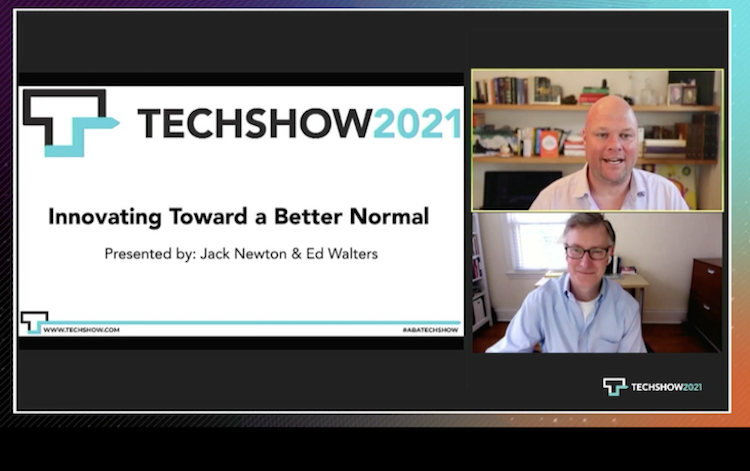Legal tech CEOs urge lawyers to keep innovating beyond the COVID-19 pandemic

Jack Newton of Clio (top) and Ed Walters of Fastcase speak Tuesday during their panel at the ABA Techshow 2021.
Lawyers should continue to embrace and further develop the technological and business innovations they have adopted in recent months even after the COVID-19 pandemic subsides, two prominent legal technology leaders said Tuesday at the ABA Techshow 2021.
“We have the opportunity today to build towards that third horizon or slouch back towards that first horizon,” said Ed Walters, CEO and co-founder of legal research company Fastcase. He enthusiastically encouraged attendees to “build the legal services and law firms of 2022, not rebuild what was broken in 2019.”
Jack Newton, CEO and co-founder of cloud-based Clio, said one way attorneys and firms can succeed in the rapidly changing marketplace is by adopting a client-centered approach rather than a lawyer-centered one.
Firms can do so by taking steps such as creating a Google My Business profile to enable potential clients to quickly find the firm online. Lawyers can also implement technologies and processes to ensure clients can easily communicate with their firms from the beginning to the end of their legal matters.
Follow along with the ABA Journal’s coverage of the ABA Techshow 2021 here.
During the Techshow session titled “Innovating Towards a Better Normal,” Newton also highlighted several statistics from Clio’s 2020 Legal Trends Report indicating clients prefer working with firms that offer a lot of electronic services.
For example, 69% of consumers prefer working with a lawyer who can share documents electronically, and more than 50% of consumers believe most legal matters can be dealt with remotely. Newton said law firms and lawyers have to a much greater degree adopted such tools during the pandemic, and those who have not would be wise to do so.
“This is how you will thrive in this new environment,” said Newton, author of The Client-Centered Law Firm: How to Succeed in an Experience-Driven World.
Meanwhile, Walters said adopting electronic tools would help lawyers spend more time focused on billable matters for clients and less on administrative tasks.
“The administrative overhead of doing some of this work can overwhelm your ability to make money in your day,” Walters said. “So, if you can reduce those administrative tasks by getting help, by using software, by expanding your markets, those can all be ways that you can be client-centered and cloud-based.”
Write a letter to the editor, share a story tip or update, or report an error.


